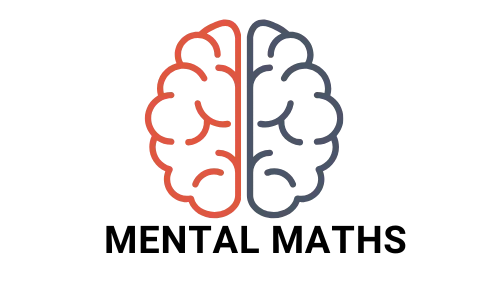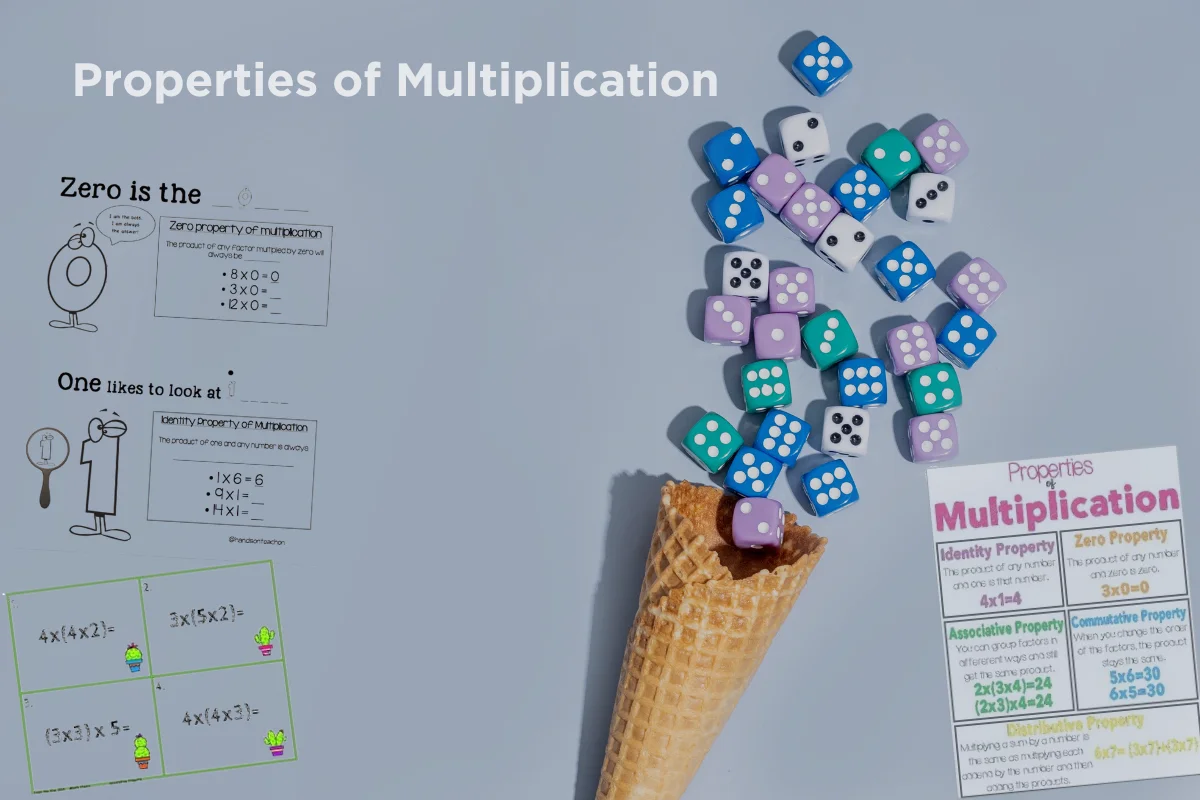Properties of Multiplication
By Alex David
Properties of multiplication are powerful tools that simplify complex calculations, making math faster and more intuitive. Whether solving equations or doing mental math, understanding these properties helps in breaking down problems efficiently.
Multiplication is one of the most widely used operators in mathematics. Let’s discuss the hidden magical properties of multiplication that help you the most.
Properties of Multiplication:
The properties of multiplication are fundamental rules or formulas that describe how numbers interact during multiplication. These properties help to simplify the expressions involving multiplication.
We know about the definition of multiplication:
“Multiplication is the repeated addition of equal-sized groups.”
Multiplication is the most vital operator among from arithmetic operators. The following properties of multiplication will help to understand this operator. In the beginning there are vital properties of multiplication that play most critical role in different mathematical problems. Later on, few other properties are discussed which become more useful with the combination these properties of multiplication.
Basic Properties of Multiplication:
There are five vital properties of multiplication:
- Commutative property
- Associative property
- Distributive property
- Identity property
- Zero property
Here is the discussion of each property.
Commutative property of multiplication:
This property stated that:
“The order of the numbers does not affect the product.”
How to learn the commutative property of multiplication mentally?
Real-life scenarios, such as calculating total apples in 2 baskets with 5 apples each, further illustrate this concept. By starting with small numbers, repeating them in different orders, and noticing patterns, learners can internalize this property.
General Form:
a * b = b * a
Example of Commutative Property:
3 * 6 = 6 * 3
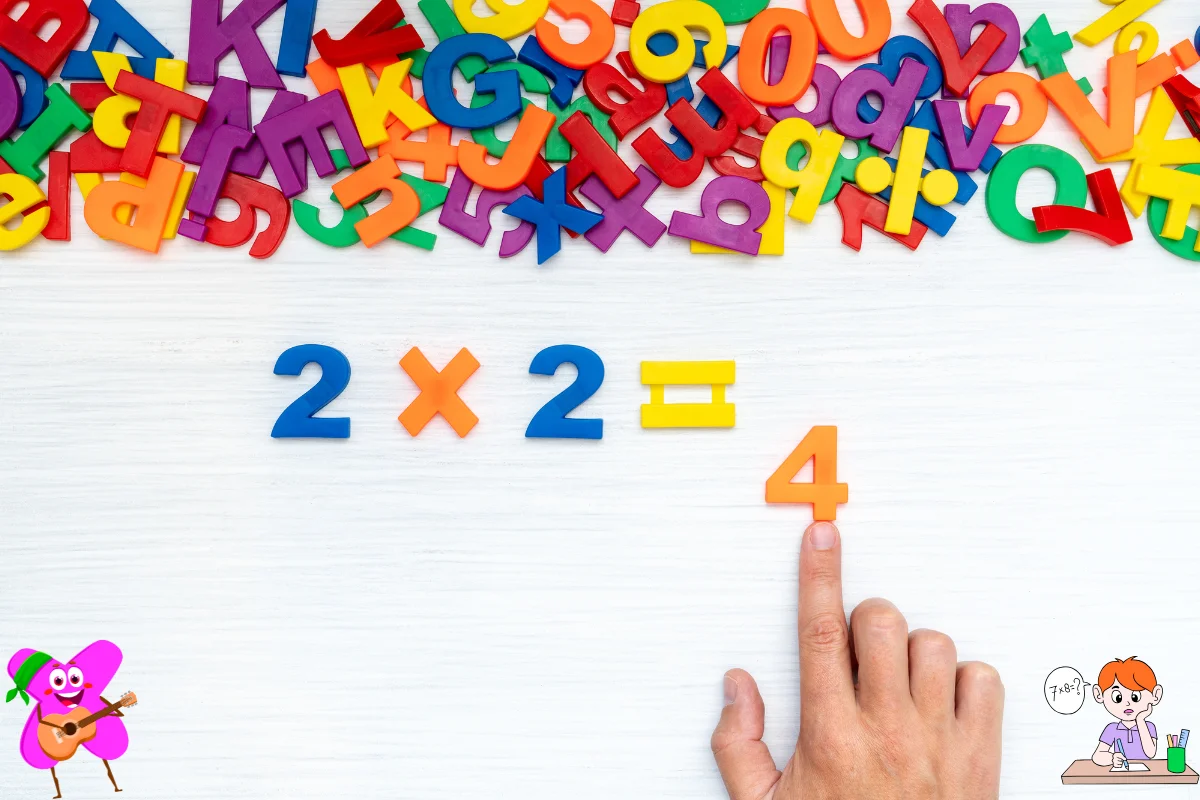
Associative Property of Multiplication:
It is defined as:
“The way numbers are grouped does not affect the product.”
How to learn the associative property of multiplication mentally?
The associative property of multiplication gives the flexibility to reorganize a problem without changing its outcome. Mentally, it’s just like rearranging pieces of a puzzle where the overall picture remains the same, no matter how you shift the pieces. This mental approach helps you quickly recognize when to group numbers efficiently, streamlining complex problems and making calculations faster and more intuitive.
General Form:
a * (b * c) = (a * b) * c
Example of Associative Property:
2 * (3 * 3) = (2 * 3) * 3 = 18
Distributive Property of Multiplication:
It is stated as:
“Multiplication distributes over addition or subtraction.”
How to learn the distributive property of multiplication mentally?
This property teaches you to divide complex problems into simpler parts while maintaining the whole problem. To master it, imagine distributing a resource—like time, effort, or materials—across multiple areas equally. It gives you the liberty to work with multiple operators. It makes the calculation simpler and supereasy.
General Form:
a * (b + c) = a * b + a * c
Example
3* (2 + 4) = 3* 2 + 3* 4
= 6 + 12
= 18
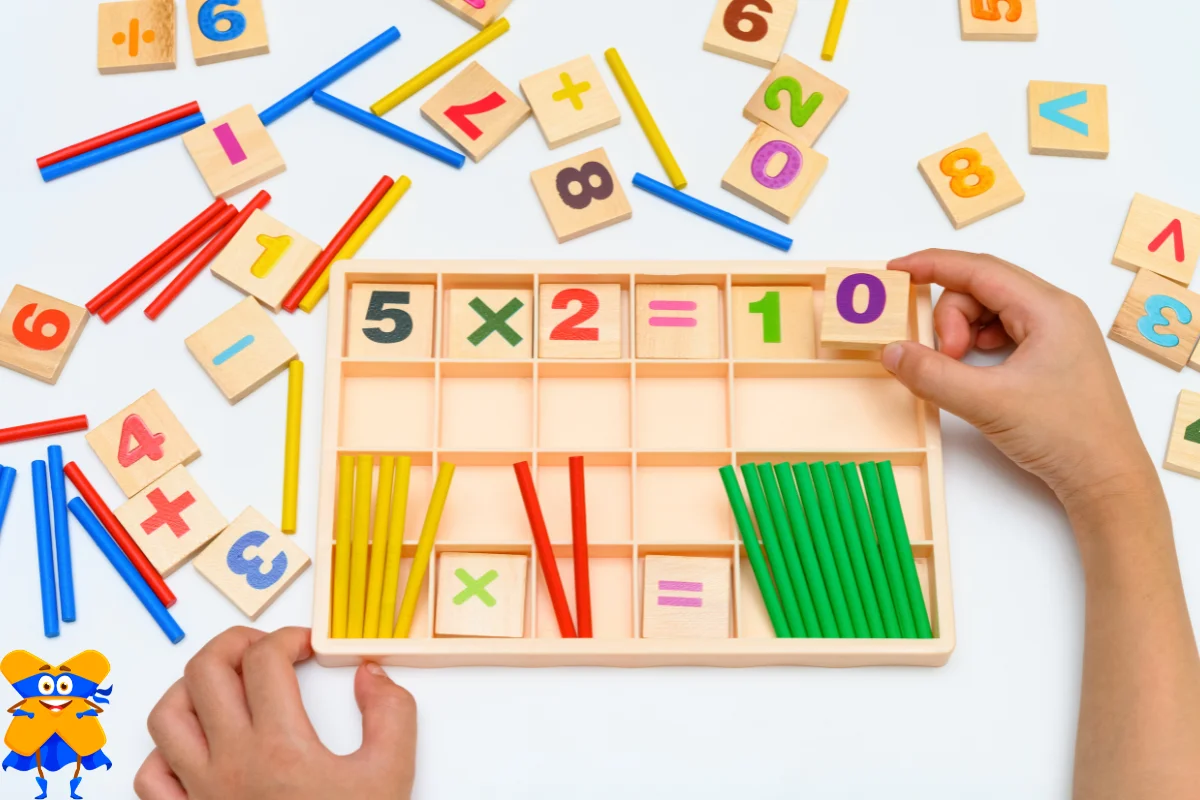
Distributive Property Over Subtraction:
a * (b − c ) = a * b − a * c
Example of Distributive Property Over Subtraction:
2 *(3 − 4) = 2 *3 − 2* 4
= 6 − 8
= − 2
Identity Property of Multiplication:
It is defined as:
“Multiplying any number by 1 gives the same number.”
How to learn the identity property of multiplication mentally?
This property works like a mirror. It allows the number to remain unchanged during calculations, which is useful in simplifying and verifying equations. Knowing this property avoids unnecessary computation and provides a solid foundation for advanced calculation. For instant calculation, it becomes like a superpower for calculation.
General Form:
a *1 = a
Example of Identity Property:
4* 1 = 4
Zero Property of Multiplication
It is defined as:
“Any number multiplied by zero is always equal to zero.”
How to learn the zero property of multiplication mentally?
When solving problems, scan for zeros and immediately “cancel out” that part of the equation in your mind. This shortcut not only saves time but also strengthens your ability to identify patterns and focus on the remaining relevant calculations, making mental math faster and more intuitive.
Above all properties of multiplication are an essential while the following are some related properties of multiplication.
Other Important Properties of Multiplication:
Let’s learn some more about the important properties of multiplication.
Closure Property of Multiplication
This property ensures that:
“The product of two numbers from a set always belongs to the set itself.”
In mathematical form:
If a, b Z (a set of integer numbers),
then
a *b Z (a set of integer numbers)
Explanation:
Mentally understand it: if you take any two numbers from a set (like a set of natural numbers, a set of whole numbers, a set of integers, etc.), then the result of both numbers belongs to the same set. It provides a base for some technical and most important topics of algebra.
Example of Closure Property of Multiplication:
Take two real numbers, like 4 and 6, and multiply both; 4 6 = 24. The final result—24, which is also a real number.
Multiplication Property of Equality
It is defined as:
“If a number (constant) multiplies on both sides of an equation, then the equality holds.”
Explanation:
Mentally, this concept can be expressed as maintaining a system. Whatever changes you apply to both sides, as long as they’re identical, the equilibrium is preserved. This mental understanding allows you to intuitively solve equations without losing track of the underlying equality, reinforcing your problem-solving process with the certainty that your operations are valid as long as they’re consistent across the board.
General Form
a = b
Let’s say “c” is a constant number; multiply it on both sides.
a *c = b* c
Example
x = 4
Multiply by 4 on both sides.
4 * x = 4 * 4
x = 16
Inverse Property of Multiplication
It is stated as:
“If you multiply a number by its reciprocal (multiplicative inverse), the final result (product) is always equal to 1.”
Explanation:
In mental math, this helps simplify complex problems by recognizing that multiplying by the inverse quickly reduces the equation to its simplest form.
The multiplicative inverse of 0 is undefined.
General Form
Let “a” be a number; then its reciprocal is 1/a so.
a * (1/a) = 1
Example of the inverse property of multiplication:
Let “3” be a number, then it’s reciprocal is 13 Now multiply both.
3 * (1/3) = 1
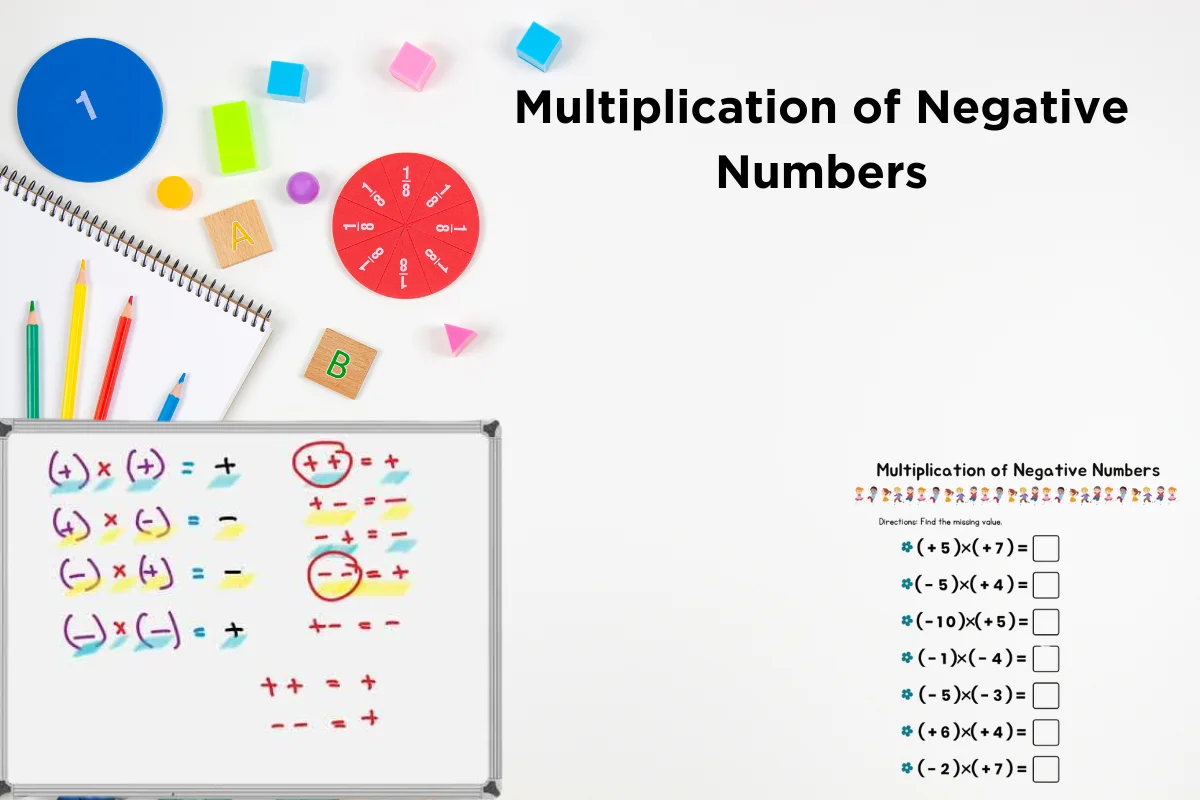
Multiplication by negative numbers:
It is defined as:
“Multiplying by a negative number flips the sign of the product.”
Explanation
Think like that; you are climbing up the stairs, taking 3 steps forward. Each step forward represents a positive number. Now, if someone says to reverse your direction and take 3 steps backward, that is like multiplying your steps by a negative number. Instead of going up (+3), you are now moving down the hill (-5).
General Form:
a *(-b) = – (a*b)
Example:
2 *(-3) = – (2* 3)
Conclusion:
The properties of multiplication make a mental framework that simplifies complex calculations, making math smoother and more intuitive. They allow us to rearrange, group, and break down numbers in ways that reduce mental effort and convert complex problems into smaller and manageable parts. These properties help us identify patterns, maintain balance in equations, and focus on key parts of a calculation without being distracted by unnecessary details.
Frequently Asked Questions (FAQs)
Q # 1: Why are multiplication properties important in math?
Multiplication properties simplify complex calculations, help in mental math, and form the basis for algebraic problem-solving.
Q # 2: How does the distributive property help in solving equations?
It allows us to break down multiplication into smaller parts, making it easier to expand expressions and simplify algebraic equations. Example:
3(x+2) = 3x+6
Q # 3: What is the difference between the commutative and associative properties?
- Commutative Property: Order changes, but the result remains the same (a × b = b × a).
- Associative Property: Grouping changes, but the result remains the same (a × (b × c) = (a × b) × c).
Q # 4: Can the identity property be applied to all numbers, including fractions and decimals?
Yes! The identity property applies to all numbers—fractions, decimals, and even negative numbers. Example:
0.5 × 1 = 0.5
34 × 1 = 34
Q # 5: What happens if multiplication does not follow the commutative property?
If multiplication were not commutative, 3 × 4 and 4 × 3 would give different answers, making basic arithmetic and algebra far more complex.
Q # 6: Why does multiplying by negative numbers reverse the sign?
Multiplying by a negative flips the direction on the number line, just like moving in the opposite direction. Example:
2 × (−3) = −6
Q # 7: How does the inverse property of multiplication help in division?
The inverse property states that multiplying by a reciprocal results in 1. This helps in division because:
(1/4 )*4 = 1 which means 4 ÷ 4 = 1
